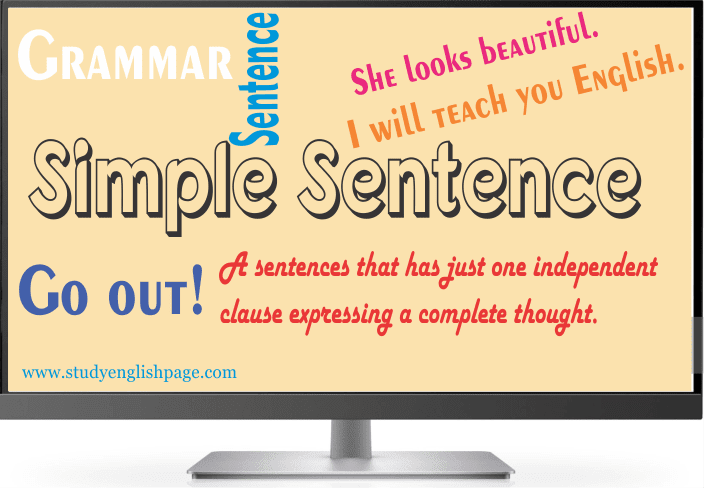Simple Sentences in English Grammar
Sentence
The definition of a
sentence is a group of words that gives complete meaning. A sentence conveys a statement, command, exclamation, or question.
A sentence has two main
things. One is a group of words, and the other is a complete meaning. Any group of words can’t be a sentence unless it gives complete thought.
- I congratulate my friends. (Sentence)
- Standing near her (not a sentence)
There are four types of
sentences structurally in English grammar. These types are simple sentences,
compound sentences, complex sentences, and compound-complex sentences. In this
article, we are concerned about simple sentences in English grammar.
Definition of Simple Sentence
A simple sentence is defined
as a sentence that has just one independent clause expressing a complete
thought. An independent clause is a group of words having a subject and verb that
stands alone. If there is just one clause that can stand alone, we call it a simple sentence. A sentence that has any dependent clause can’t be simple.
- I will teach you English. (Simple Sentence)
- I will teach you English if you want. (Not Simple Sentence)
- Ali and Diya like swimming and fishing but hate hiking and hunting. (Simple Sentence)
In the first example, we
have one independent clause that stands alone and expresses a complete thought.
In the second example,
there are two clauses. One is an independent clause, and the other is a dependent
clause, so it is not a simple sentence.
The last one is a simple sentence. It has one independent clause. It has compound verbs and nouns.

More Examples of Simple Sentences
- Go out!
- She always looks beautiful.
- You can cross the river easily.
- Ali and Diya respect their teachers.
- I like the site StudyEnglish Page.
- They study and help their mother at home.
- They study math for an hour and English for 3o minutes.
- This article is about simple sentences in English grammar.
- Ali and I tried our best to convince John and Jack but failed.
Key Points about Simple Sentences
To know completely about
simple sentences, the following key points must be in your mind. These key
points can perfect your knowledge of simple sentences.
Single Clause
A simple sentence consists of just a single clause. The
single clause also must be an independent clause. It is a very important
point related to a simple sentence. Don’t make a mistake by using more than one
clause while making a simple sentence.
- They distributed many sweaters among the poor people.
- I and my friend will take admissions at university next year.
Coordinating Conjunction
We can use coordinating conjunctions in simple sentences when
performing the same function. We don’t use a comma before the conjunction when we
are talking about simple sentences. Using a comma before coordinating
conjunction creates two clauses.
- I can eat and drive at the same time. (Simple sentence)
- I am going to Canada and London next month. (Simple sentence)
Mid Punctuation
Mid-punctuation like using a comma, a colon, or a semicolon
before coordinating conjunction shows the joining of two clauses. A simple sentence
has the property of using just one clause, so avoid using mid-punctuation in
simple sentences.
- Ali studied math and went out. (Simple sentence)
- Ali studied, and he went out. (Not simple sentence)
Compound Subjects and Verbs/Predicates
Compound means more than one; compound subjects and verbs/predicates
mean more than one subject and verb/predicate sharing the same verb and the
same subject respectively. We can use compound subjects, and verbs/predicates
in simple sentences. The subjects and verbs/predicates are joined by using
coordinate and correlative conjunctions.
Compound Subjects
- Ali and Diya ate dinner at home.
- Neither Ali nor Diya invited me to the dinner.
Compound Verbs
- John studied and went out.
- He tried his best but failed.
Compound Predicate
- Ali studied English and watched TV.
- I observed him but did not find any fault.
Using Modifiers
Simple sentences don’t have things that are as simple as
their names. You can use modifiers like articles, adjectives, adverbs, and
prepositional phrases. Modifiers are used to add something more to the sentence.
You can check here their examples.
Articles
- The dog chased my friend.
- You need to have an umbrella on a rainy day.
Adjectives
- We are talking about simple sentences.
- I have been working in a large company for three hours.
Adverbs
- He immediately responded to me.
- You have to go back as quickly as possible.
Prepositional Phrases
- I don’t attend personal calls at work.
- I am not concerned about his personal life.
- Types of sentences
- Declarative Sentences
- Command Sentences
- Questions
- Exclamations
- Compound Sentences
- Complex Sentences
- Compound Complex Sentences
- Compound vs Complex Sentences
